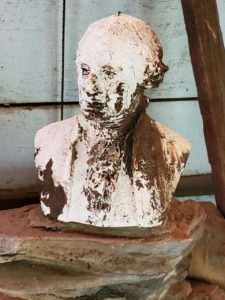Miss Read’s Last Test

.
.
Sifting through the documents that have accumulated in my office over decades, I found two pages of text purportedly attributed to “Miss Read.”
[Wiki: Dora Jessie Saint MBE (17 April 1913 – 7 April 2012), née Shafe, best known by the pen name Miss Read, was an English novelist, by profession a schoolmistress. Her pseudonym was derived from her mother’s maiden name. She is best known for two series of novels set in the British countryside – the Fairacre novels and the Thrush Green novels.]
The origin of this text is unknown; there are no notes accompanying the document. I have annotated the text, in part in order to date it. I found out it is at least 50 years old. The premise is a test asking the student to answer 15 questions and perform tasks, within an hour, that would each take a lifetime to accomplish, if at all. I have interspersed the text I found with my today’s commentary, in [] brackets.
Miss Read’s Last Test
You may begin as soon as you are ready.
Instructions: Read each question carefully. Answer all questions. Time limit 1 hour. Begin immediately.
1) Medicine
You have been provided with a razor blade, a piece of gauze, and a bottle of scotch. Remove your appendix. Do not suture until (sic) your work has been inspected. You have 15 minutes.
[A do-it-yourself gall bladder operation occurs in my German piece that is part of “Die Ernte der Seltenheit” written in the 80s and recently published in Signaturen Magazin]
2) History
Describe the history of the Papacy from its origins to the present day, concentrating especially but not exclusively on its social, political, economic, religious, and philosophical impact on Europe, Asia, America and Africa. Be brief, precise, specific.
3) Public Speaking
Two thousand drug-crazed aboriginals are storming the class room. Calm them. You may use any ancient language except Latin or Greek.
[Here we do notice a cultural sensitivity issue, which dates the piece. It’s not drug-crazed people storming in, but drug-crazed aboriginees]
4) Biology
Create life. Estimate the difference in subsequent human culture if this form of life had developed 500 million years earlier, with special attention to its probable effect on the English parliamentary system.
[The reference to the parliamentary system places the piece. Even though the associations vary widely in this piece of satire, the particular pick would not have occurred to someone outside England or the UK, as too boring.]
5) Music
Write a piano concerto. Orchestrate and perform it with flute and drum. You will find a piano under your seat.
6) Engineering
The disassembled parts of a high-powered rifle have been placed in a box on your desk. You will also find an instruction manual printed in Swahili. In 10 minutes a hungry Bengali tiger will be admitted to the room. Take whatever action you feel is appropriate. Be prepared to justify your decision.
7) Sociology
What sociological problems might accompany the end of the world? Construct an experiment to test your theory.
8) Management Science
Define management. Define science. How do they relate? Create a generalized algorithm to optimize all managerial Decisions. Assuming an 1130 CPU supporting 50 terminals, each terminal to activate your algorithm, design the communications interface and all necessary control problems.
[This dates the piece more precisely. The IBM 1130 came on the market in 1966. Terminals ceased to be used after PCs made their appearance. The communication interface and control problems are trivial by today’s standards.]
9) Psychology
Based on your knowledge of thier (sic) works, evaluate the emotional stability, degree of adjustment, and repressed frustration of each: Alexander of Aphrodiasis, Ramses II, Gregory of Nicaea, Hammurabi. Support your evaluation with quotations from each man’s work. It is not necessary to translate.
[This is an interesting selection of personalities, which could only originate from someone with a very rounded education in the classics. We can comfortably place the writer in Cambridge or Oxford.]
10) Political Science
There is a red telephone on the desk beside you. Start World War III. Report at length on the sociopolitical effects, if any.
[Here and in the Medicine piece, the completely over-the-top concept points to British humor]
11) Economics
Develop a realistic plan for refinancing the national debt. Trace the possible effects of your plan on these areas: Cubism, Donatist controversy, the wave theory of light.
[Donatism was a Christian sect leading to a schism in the Christian Church, in the region of the Church of Carthage, from the fourth to the sixth centuries AD. Donatists argued that Christian clergy must be faultless for their ministry to be effective and their prayers and sacraments to be valid. – Again we have a person of letters, or in fact an entire team of brain-stormers with different backgrounds]
12) Epistomology
Take a position for or against truth. Prove the validity of your position.
[This idea has been of course complete absurd, right from its premise, until recently when a deeply disturbed man devoid of moral or intellectual footing gained a position of power and pushed the notion that “truth” in itself is a relative concept.]
13) Physics
Explain the nature of matter. Include in your answer an evaluation of the impact of the development of mathematics on science.
[This is quite lame, compared to all other sections]
14) Philosophy
Sketch the development of human thought. Estimate its significance. Compare with the development of any other kind of thought.
[ditto]
15) General Knowledge
Describe in detail, briefly.
16) Extra Credit
Define the Universe. Give three examples.
[This hints at the concept of multiverse. Unsure if this was already viable in the sixties.]
.
.

Leave a Reply